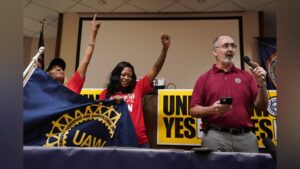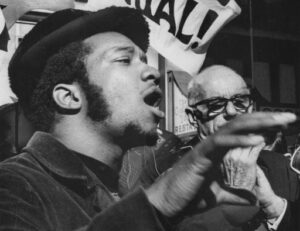In a recent article, Adam Shils makes the case that the Left shouldn’t criticize Teamster president Sean O’Brien’s visit with Donald Trump at Mar-A-Lago (where, according to O’Brien, they had a “productive discussion”), Trump’s recent visit to Teamster headquarters, and the union’s contribution of $45,000 (the maximum legally allowable) to the Republican National Committee (RNC). “Nothing has taken place that would lead socialists to change their general support of the O’Brien leadership and their endorsement of the orientation of Teamsters for a Democratic Union (TDU).”
Of course, Adam insists at the outset, our principles require that “socialists…oppose any dalliance between the Teamsters and Trump—just as we should oppose the union’s probable endorsement of Biden this fall.” But the rest of the article, instead of criticizing O’Brien for his “dalliance” with Trump, makes excuses for it.
What are his excuses? 1. The Teamsters haven’t actually endorsed Trump. 2. Vetting candidates of different parties and donating money to both of them is a “common procedure in American politics.” 3. In visiting Trump at Mar-a-Lago, the Teamsters were merely “trying to position themselves to function under a second Trump administration.”
Adam’s fourth point, which is unrelated to the questions of this “dalliance” with Trump, is that the Teamsters are better off under the O’Brien-Zuckerman leadership than they would be if the Hoffa-picked Vairma-Herrera slate won. But this links two questions together that can and should be decoupled.
It is true that O’Brien’s two meetings with Trump and the Teamsters’ contribution to the GOP don’t constitute a formal endorsement. The question is: what kind of message does it send?
Republicans and Democrats: Both capitalist parties, but not identical
As Adam notes, socialists are opposed to both capitalist parties; he forgot to add that they are not identical parties. They both share the same ruling-class character but offer different strategies for maintaining the class status quo. The Republicans tend to be more forthright in their support for the billionaire class, while the Democrats lean toward a softer approach, professing more sympathy for the working class and the oppressed. The Democrats are the “pro-choice” party, while the Republicans are stridently anti-abortion. Joe Biden claims he is the “most pro-union president” in history, while Trump can make no such claim. When Trump was asked in an Iowa town hall in November whether he supports union labor, he responded, “If I had my choice,” he said, “I think I’d take it without.’’
Support for one party therefore doesn’t signal the same thing as support for the other. Unions have backed Democrats since the New Deal of the 1930s, based upon the illusory expectation that it is a party more amenable to the needs of ordinary people. Trump’s GOP, on the other hand, is an openly racist, anti-immigrant, anti-abortion, anti LGBTQ, and anti-union party. There can be little doubt as to what you are voting for when you vote for Trump. Nobody, for example, has ever claimed that the GOP is a graveyard of social movements the way the Democrats are.
Adam insists that we look at this question in a “broader political context.” Let’s do that. The context is that we have a hard-right presidential candidate—a flagrantly racist, sexist, anti-immigrant, anti-working class, swindling billionaire; a man who mobilized his most far-right supporters to overturn the last presidential election. Trump narrowly avoided prosecution for making millions running a fake university; he has been convicted for “sexual abuse” in a recent civil trial, and he faces a whole host of other legal challenges.
Legitimizing Trump
Adam strongly implies O’Brien’s commitment to union democracy led to a meeting with Trump, since many rank-and-file IBT members support Trump. “Would union democracy be enhanced by giving the leadership veto power of who could and couldn’t seek the union’s endorsement?” Adam asked.
But O’Brien’s dealings with him lends Trump and the right-wing politics he represents political legitimacy. As a Trump adviser told The Washington Post of the meeting at Teamster headquarters, “It’s a win just being here.”
TDU maintained full radio silence on this question for months, but longtime TDU organizer Ken Paff recently wrote a lengthy article in Jacobin. He argued, “We are an independent, rank-and-file movement,” but negated this assertion in the same sentence when he added “and the junior partner in a coalition with top leaders.” Later, he stated, TDU’s focus is on building worker power in action, not issuing report cards or attacks against our coalition partners.”
But not all activist Teamsters agree—and have had things to say that we as socialists should pay attention to. For example, as the Guardian reported,
Jess Lister, a shop steward in Georgia and member of the Teamsters LGBTQ caucus, who has helped lead a campaign to organize part-time UPS workers, called the meeting “a slap in the face.” Lister added that she did not support any of the frontrunner candidates or Biden, but said she viewed the Trump meeting as especially galling given his record of stacking the courts with anti-union judges and overseeing a National Labor Relations Board (NLRB) that issued rulings making it harder for workers to organize.
“He has a longstanding history of racism, of hate towards women, towards minorities, towards the LGTBQ community—he is not accepting of other people,” Lister said. “Our union president shouldn’t even entertain the idea of a meeting. That shouldn’t have even been on the table.”
“’Playing both sides of the aisle”
Adam is also wrong to state, “’Playing both sides of the aisle,’ that is donating to both parties at the same time is an extremely common procedure in American politics. Unions and other institutions have been doing it for decades.” But, while the corporate class plays “both sides of the aisle” on a regular basis, unions rarely do. The vast majority of unions support Democrats in elections, as mentioned above. The mafia connected IBT was one of the rare exceptions when it supported Republican Richard Nixon for president in 1960 and 1972 and then Ronald Reagan in 1980 and 1984.
Not surprisingly, UAW president Shawn Fain—who recently led the United Auto Workers on a very successful 46-day strike against the “Big Three” automakers—said of Trump: “I see no point in meeting with him because I don’t think the man has any bit of care about what our workers stand for, what the working class stands for. He serves a billionaire class, and that’s what’s wrong with this country.”
Fain stated bluntly in January, “Donald Trump is a scab. Donald Trump is a billionaire, and that’s who he represents.” The UAW has not surprisingly endorsed Biden.
As mentioned above, Adam lumps together two issues that should be separated: O’Brien’s visits with Trump and whether O’Brien is an improvement over Vairma.
There is a legitimate debate to be had as to what degree O’Brien is an improvement over Vairma. There is also a legitimate debate to be had as to the degree to which the recent UPS contract is a victory, and whether or not a strike should have been called by O’Brien.
The Teamsters for a Democratic Union
What is less in question, in my opinion, is what has happened to TDU since it decided to endorse O’Brien.
The Canadian socialist Sam Gindin considers the latest UPS contract a clear victory. And he agrees with TDU supporting O’Brien against the Hoffa-chosen candidate in the last union election. He also had this to say, however, about TDU’s role:
What of TDU’s role in this agreement? There was a moment in US labor history when democratization and stubborn resistance challenged the corporate-state determination to decisively weaken the labor movement. Groups like TDU fought back courageously and organized effectively, but they were not immune to the pressures and defeats around them. In that context of demoralization and lowered expectations, it is not all that surprising that TDU came to pin its hopes on the election of Sean O’Brien, a defector from the Hoffa caucus, as the new Teamster president.
O’Brien was a breath of fresh air after what Teamsters had been through. He offered TDU a chance to be more influential inside the union, and – in a bow to labor militants – went to the 2022 conference of Labor Notes and spoke aggressively, to wild cheers, about shutting corporations down and unionizing Amazon.
The problem was not TDU supporting O’Brien over the Hoffa-chosen candidate, especially since the group could not win on its own and running would split the progressive vote. Rather, the issue was that TDU gave up most of its independence in exchange for an influential role in the contract campaign. It was integrated into the O’Brien camp and – despite some independent organizing early in the campaign – became loyal in carrying out the limited bargaining program. (https://socialistproject.ca/2023/08/missed-opportunity-closer-look-teamsters-ups/)
“General support?”
One final point. Adam argues, as I already noted, that O’Brien’s meeting with Trump shouldn’t “lead socialists to change their general support of the O’Brien leadership.”
What is entailed by the term “general support”? As independent socialists, we have not been in the habit of offering such blanket endorsements of union leaders—always maintaining the right to criticize. Rosa Luxemburg long ago pointed out that union leaders are in a contradictory position vis-a-vis labor and capital:
The specialization of professional activity as trade-union leaders, as well as the naturally restricted horizon which is bound up with disconnected economic struggles in a peaceful period, leads only too easily, amongst trade-union officials, to bureaucratism and a certain narrowness of outlook. Both, however, express themselves in a whole series of tendencies which may be fateful in the highest degree for the future of the trade-union movement. There is first of all the overvaluation of the organization, which from a means has gradually been changed into an end in itself, a precious thing, to which the interests of the struggles should be subordinated. From this also comes that openly admitted need for peace which shrinks from great risks and presumed dangers to the stability of the trade-unions.
For this reason, revolutionary socialists have long held the position that we support union leaders insofar as they represent the interests of the rank-and-file and oppose them insofar as they misrepresent them. But we never offer blanket endorsement of union leadership—particularly in the US, the land of business unionism.
Paul D'Amato is the author of The Meaning of Marxism and was the editor of the International Socialist Review. He is the author of numerous articles on a wide array of topics.




